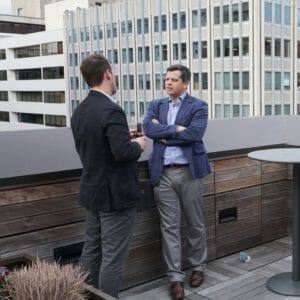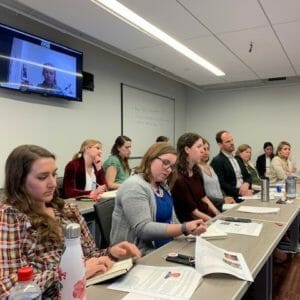This blog post was written by Arizona State University graduate student Annalise VanVranken. In addition to studying Food Policy and Sustainability Leadership at ASU, Annalise is a Strategy and Partnerships project manager for FoodCorps, where she works to connect kids to healthy food in schools all across the US.
“I do not despise genius-indeed, I wish I had a basketful of it. But yet, after a great deal of experience and observation, I have become convinced that industry is a better horse to ride than genius. It may never carry any man as far as genius has carried individuals, but industry-patient, steady, intelligent industry-will carry thousands into comfort, and even celebrity; and this it does with absolute certainty.” Walter Lippmann
This quote encapsulates much of the way I feel when I reflect on the influence of industry. When I think of industry, I think power. Power can shift entire systems and make a whole lot of change; sometimes good, sometimes bad, all depending on who’s calling the shots. It was fitting to be able to learn from four powerhouse industry experts who shared their perspective about policy, sustainability and leadership in the food system during our week-long immersion course in Washington D.C.
These incredible panelists included: Chris Adamo, from the world’s largest B Corp, Danone North America; Kenny Thompson Jr, of PepsiCo, the largest food and beverage company in the U.S.; Anne MacMillan came from Invariant, the largest woman-owned government relations firm in D.C.; and Karis Gutter, a Marine Corps Reserve veteran, who leads US Government and Industry Affairs at Corteva Agriscience. This group has over 60 years of combined experience in the field, including 35 years in government as analysts, staffers and advisors with agencies in the United States Department of Agriculture, the House and Senate, and even the White House.
You better believe that they had some major insight to share. They kicked things off by asking whether shifting from public service into the private sector was considered “selling out”. They jokingly responded, “well, someone needs to do it!”. Kidding aside, they shared an important message about representation across industry, including changing who’s at the leadership table. There is abundant need for greater diversity, particularly diversity of thought within industry. They believe it is integral that we have more people who understand the supply chain in Congress, and/or are being informed by supply chain experts. They shared that this is what excites them about being part of this sector; being able to bring their own passions, like sustainability to the table. They explained that groupthink needs to shift and that they see their roles as being part of that disruption. However, Anne warned, “perfect is always the enemy of good”, which is exactly why she and the other panelists aim to build coalitions to help reach compromise. They made it clear that specific people, plus new processes, mean that industry is able to take on new initiatives around sustainability, or anything else, and make considerable strides forward.
This prompted a fellow student to ask how they bring the general public along on a journey they might want to take as a company. They admitted that industry often has a hard time connecting with consumers and explained how you have to talk to the end-consumer about the importance of any given initiative, not just the farmer or producer. You have to learn how to talk and listen to the consumer, since at the end of the day, they hold the power. As Chris confirmed “you really can vote with your food dollar”. To show consumer demand is real, Kenny shared the importance of diversification of products and finding new ways to compete, using an example of growing the number of bottled water and teas in their portfolio, as the popularity of soda has decreased in recent years. There is no mandate to talk to the consumer, but any smart company uses a lot of consumer data to evaluate and inform strategy.
This can also work in reverse, thanks to brand loyalty and the power of persuasion. With the command of social science, you can change consumer behavior. Do people know what they want, or can you actually find ways to influence their choices? Because the companies the panelists represent operate worldwide, they can often see the next trend coming down the line and spread ideas across the globe. They are able to use this information not only to influence customers, but also share this awareness with Congress via their lobbying and policy efforts. For example, they can see that something like sustainable diets is trending in Europe and use those concepts to expand efforts in the U.S.
So, not to fear, persuasion doesn’t always have to be the enemy, for as Walter Lippmann said, industry can “carry thousands into comfort” which I think is showcased by much of the great work that our panelists’ companies are working toward. For example, Danone’s vision is “One Planet. One Health”, in which they aim to reconnect people with their food and see their role as an organization to utilize their scale to “change the world for the better”. They are seeing many of their brands, like Horizon Organic, Evian and International Delight, work toward their target of carbon neutrality. They hope that this will continue to encourage other brands and companies to step up their sustainability efforts and initiatives and put incentives in place to guide and support producers in meeting these goals.
As we continue to navigate through so many unknowns in light of COVID-19, I am reminded of the power of industry. Kenny shared the strategies they have already been working on to address food deserts and food insecurity through PepsiCo and now have committed more than $45 million globally to bring food and vital resources to those in need to combat the impacts of COVID-19. Similarly, Danone has pledged $1.5 million in support to food banks and food rescue organizations, and financial support amounting € 300M to the 15,000 small businesses in their global network of farmers, suppliers, service providers. In many ways industry is stepping up in this moment of crisis, while folks like are panelists are patiently, steadily preparing to steer us into a more sustainable future when the crisis subsides.
Could you be the next food industry leader?! Or perhaps the next farmer/congresswoman? We here at the Swette Center think so and want to help you get there! For more information check out the new suite of Swette Center degrees and educational opportunities here! Applications are still being accept for the fall 2020 cohort, but not for much long, so don’t delay!

